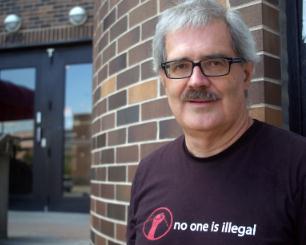The values of queer activism have changed, according to long-time activist and sociologist Gary Kinsman. Kinsman looks at why, and how, in two upcoming Toronto lectures, titled The Making of the Neo-Liberal Queer and Queering Heterosexism in the Social Form of Legal and State Formation.
Xtra chatted with Kinsman ahead of the lectures.
Xtra: What do you mean by the “neoliberal queer?” What interests you about this figure?
Gary Kinsman: There are two terms that have begun to be used by people in the context of queer theory and activism to describe the assimilation of larger layers of queer people into the existing order: there’s “homonormativity,” popularized by Lisa Duggan, describing the sort of middle-class normalness that becomes dominant within our communities and cultures. The other term, “homonationalism,” comes from Jasbir Puar. It describes how some lesbians and gay men in Western and northern countries come to identify with their nation state as the liberator of queer people and how gay rights and women’s rights have been deployed to justify the war in Afghanistan, the occupation in Iraq, and Western opposition to the Palestinian struggle for self-determination. I’m trying to identify the social process that leads to this major shift in queer politics.
What are some examples of that process?
First of all is the shift from the liberation movement to a movement focusing on questions of rights. The people who originally articulated the human rights strategy for the LGBT movement were radical, political people who thought of it as simply a tactic. The emphasis on “rights” now actually undermines the more transformative commitments of those earilier activists. Another instance would be the bath raids in Toronto. That movement was led by grassroots and bar people but ended up producing a new professional, managerial, gay middle class. They became the dominant voice for our community, obscuring the class politics. We moved in the direction of formal legal equality and left aside all our concerns for substantive social equality. I don’t want to reduce the significance of [legal equality], but it does shift the character of our movement.
So has the discourse of “rights” exhausted its potential?
You have this contradiction of, on the one hand, being formally and legally equal to heterosexuals and, on the other hand, the heterosexist terror that young people face on the streets and schools. We’ve made remarkable progress, but we certainly haven’t achieved liberation.
One example: if we are serious about dealing with the heterosexism and transphobia that young queer people face in the school system, it requires doing far more than having GSAs, far more than talking about transformations of the curriculum, far more than an anti-bullying campaign. High schools remain the training grounds for the reproduction of hegemonic heterosexual masculinity in society. We’re not getting at the social roots of violence.
Is that happening anywhere?
There are pockets of especially young, queer people critical of the mainstream movement who are actually fighting queer liberation battles. But what they’re doing is tied up with anti-poverty struggles, migrant rights, other movements.
How do those types of coalitions work? For instance, how could non-aboriginal queer people work in solidarity with a native movement like Idle No More?
How do we create a queer politic that responds to the needs of all people? There are lots of queer and two-spirited indigenous people involved in that movement, as well as lots of white settler queer people. So how do we actually do that? There’s a balancing act between a commitment to how our queerness is bound up with all of these other social movements and at the same time always trying to develop autonomous or specific queer politics around that. It’s not easy.
A lesbian recently became Ontario’s premier. What’s the role of gay politicians?
That Kathleen Wynne can even be the premier of Ontario is a legacy of our liberation movement. That there are lesbian and gay people who are public figures makes a difference, but it doesn’t make much difference if the policies those people implement disadvantage the majority of queer people. The Liberal Party is clear about its commitment to neoliberalism and austerity politics. Kathleen Wynne is involved with that. Glen Murray, also, shows how there are neoliberal queers.

 Why you can trust Xtra
Why you can trust Xtra


